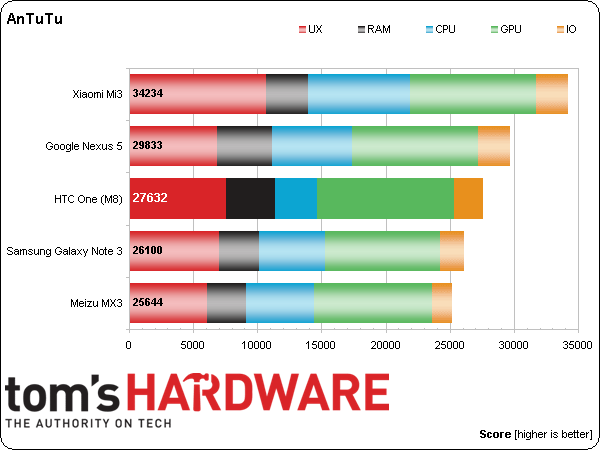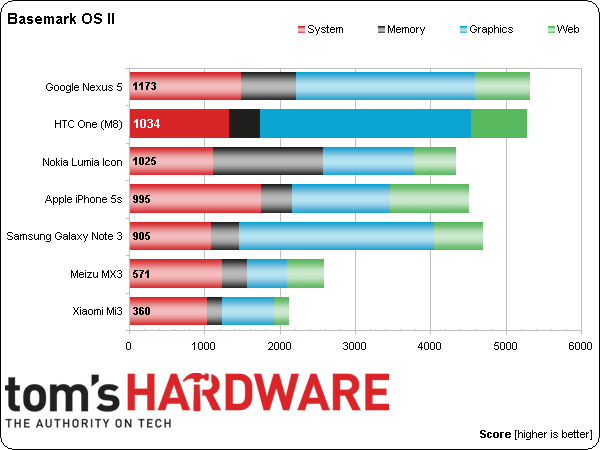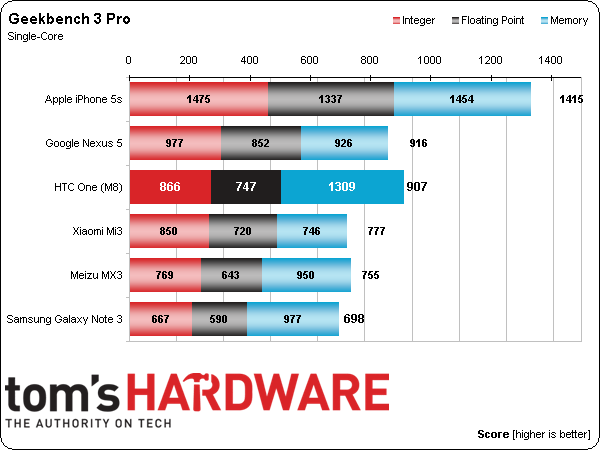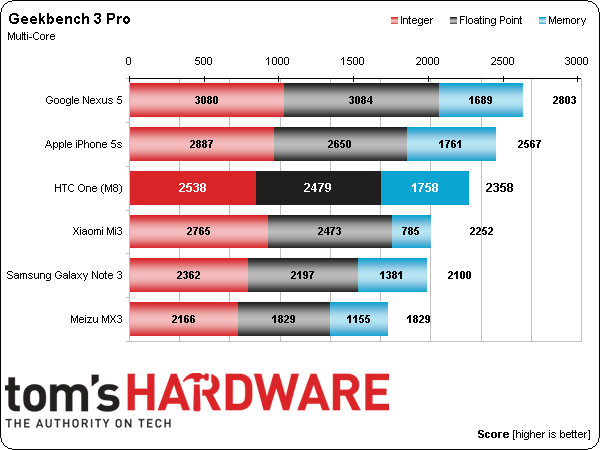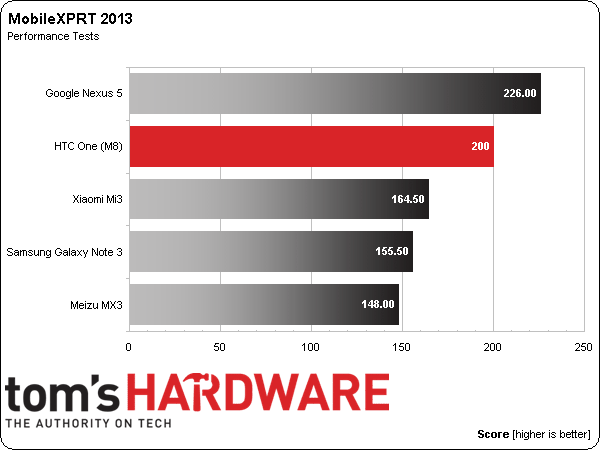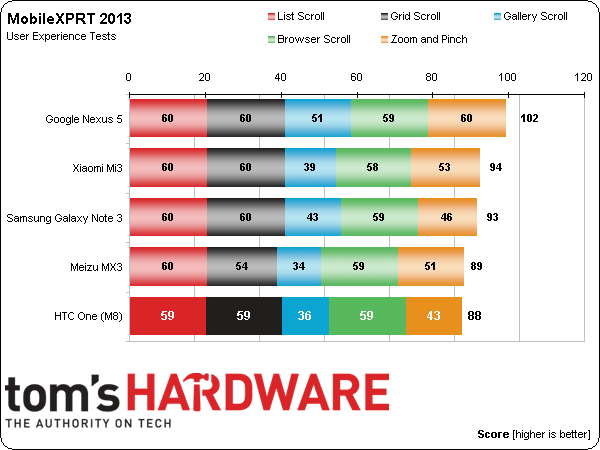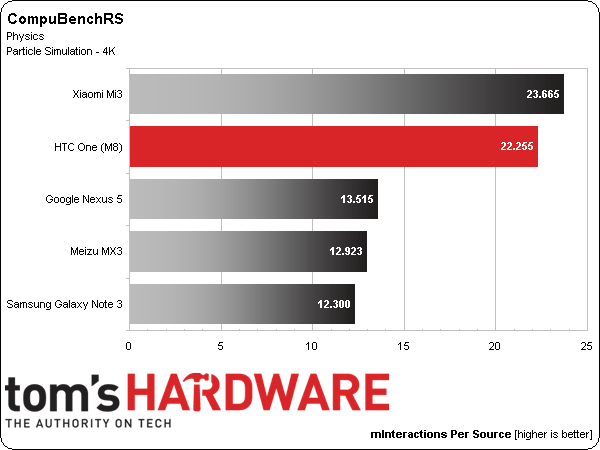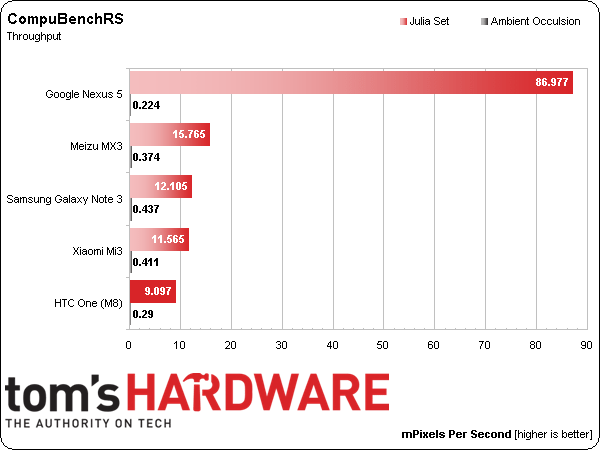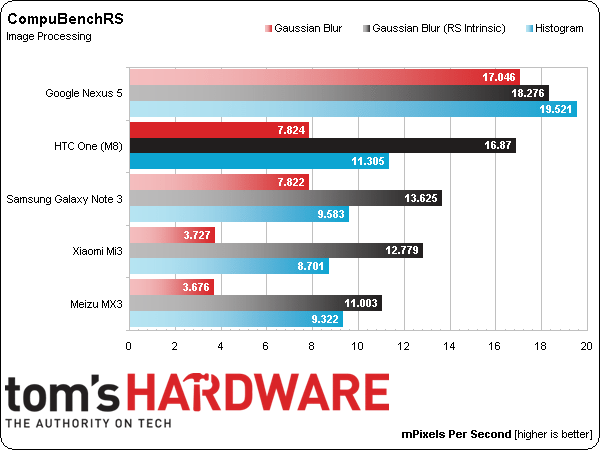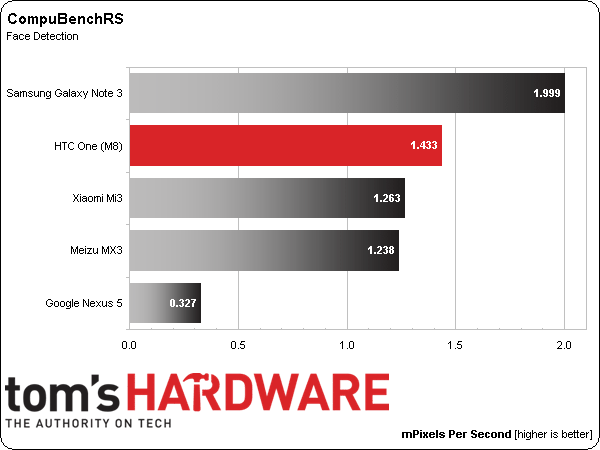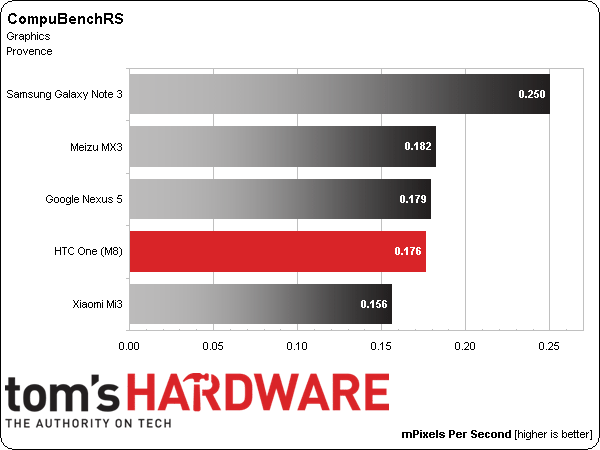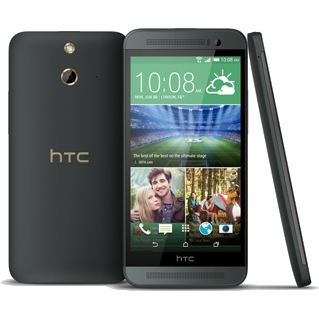HTC One (M8) And One (E8) Review: A Flagship And Its Sidekick
We run HTC's flagship Android smartphone, the One (M8), through our exhaustive benchmark suite. In addition, we take a close look at its less expensive sibling, the HTC One (E8). Both devices are compared and tested against a strong field of competition.
Results: CPU Benchmarks
AnTuTu
AnTuTu is an Android system benchmark designed to test the performance capabilities of four major aspects of mobile devices: graphics (encompassing 2D, UI, and basic 3D), CPU (fixed, floating-point, and threading), RAM (read and write), and I/O (read and write).
HTC's One (M8) performs almost identically to Google's Nexus 5, losing a little ground when it comes to RAM and CPU speed, but gaining back points thanks to a faster GPU. The Xiaomi Mi3's Tegra 4 chipset does well in this benchmark.
Basemark OS II
Rightware is an experienced multiplatform benchmark developer. The company leverages this experience with Basemark OS II, an all-in-one tool designed for measuring the overall performance of mobile devices. The test is available on all major smartphone platforms, including Android, iOS, and Windows Phone 8. Basemark OS II uses a similar approach to Geekbench, but focuses on more application-specific areas, particularly User eXperience (UX), Web browsing, and rendering performance.
Once again, the One (M8) comes close to the Nexus 5. Check out that memory benchmark result, though. Google specifies the Nexus' memory subsystem at 800 MHz, while HTC doesn't publish the One's clock rate. Once again, a higher GPU frequency helps push the One (M8)'s aggregate score to a near-tie.
Geekbench 3
Primate Labs' Geekbench is somewhat of an industry standard due to its long-standing database and wide cross-platform compatibility (Windows/OS X/Linux/iOS/Android). This simple system benchmark produces two sets of scores: single- and multi-threaded. For each, it runs a series of tests in three categories: Integer, Floating Point, and Memory. The individual results are used to calculate category scores, which, in turn, generate overall Geekbench scores.
This test is run on one core of each phone's SoC. We see the One move ahead with a higher memory score than Google's Nexus, which contrasts with the previous two benchmark results. Lets see what happens when multiple cores are utilized.
HTC's One (M8) loses ground to the Nexus, but still registers a superior memory result. Apple's iPhone 5s performs better in this test, pulling slightly ahead of HTC's entry.
Get Tom's Hardware's best news and in-depth reviews, straight to your inbox.
MobileXPRT 2013
Principled Technologies' MobileXPRT 2013 is a modern SoC benchmark for Android. It consists of 10 real-world test scenarios split into two categories of testing: Performance and User Experience. The Performance suite contains five tests: Apply Photo Effects, Create Photo Collages, Create Slideshow, Encrypt Personal Content, and Detect Faces to Organize Photos.
It's interesting to see HTC's One (M8) trail slightly behind the Nexus again, particularly since its advertised CPU clock is slightly higher.
The User Experience suite also has five tests: List Scroll, Grid Scroll, Gallery Scroll, Browser Scroll, and Zoom and Pinch. These results are measured in frames per second. The category scores are generated by taking a geometric mean of the ratio between a calibrated machine (Motorola's Droid Razr M) and the test device for each subtest.
Although these results are all pretty close, HTC still ends up in the back of the pack. A slightly lower gallery scroll and zoom/pinch result is responsible for that position, even if we didn't notice any subjective sluggishness during our time with the One (M8).
CompuBench RS
CompuBench RS is somewhat unique, as it's the first professional RenderScript benchmark. It tests the compute performance of heterogeneous multi-core systems on Android devices that support the RenderScript API, meaning it tasks both the CPU and GPU to perform compute-oriented calculations. The physics workload is a particle simulation, the throughput workload is composed of ambient occlusion and fractal calculations, the image processing load is a combination of Gaussian blur and histogram equalization filters, the face detection workload is its own algorithm, and the graphics test renders a scene dubbed 'Province'.
Current page: Results: CPU Benchmarks
Prev Page How We Tested HTC's One (M8) Next Page Results: GPU BenchmarksDon Woligroski was a former senior hardware editor for Tom's Hardware. He has covered a wide range of PC hardware topics, including CPUs, GPUs, system building, and emerging technologies.
-
Heironious The pricing says 1,309.00 for it on Amazon? May as well buy it straight from an authorized dealer for half that. It's a gorgeous phone and I don't regret picking it up over the Samsung S5 (mostly because of the cheap plastic of Samsung).Reply -
LordConrad I love my M8 except for that stupid depth-camera, they should remove it and bring back OIS.Reply -
JOSHSKORN Just stop comparing to the iPhone 5s until a comparable 64-bit chip is released and implemented into Android phones. Until then, the iPhone 5s "appears to be faster" (only on benchmarks) but as many of us know, it justifies buying an iPhone for most users, even though a 64-bit processor in a mobile phone may be pointless (for now).Reply -
CaedenV If I were the android type I would get this phone hands-down. If they released a WP version then I would jump all over it over the stuff Nokia has been pushing out in 2014 so far.Reply
The only 'complaints' that I have are the lack of wireless charging (impossible due to the metal back plate right?), and the lack of a sort of Nokia Glance screen (though other android devices are picking up similar features). The cover seems to bring that Glance functionality... but I really don't like that cover and would rather not. The thing is that with my lowly 920 I have built myself an upright wireless charging stand, and with glance screen enabled whenever the device has access to power, it makes a most excellent clock/notification center. With my 920 approaching 2 years old I am starting to look for a replacement, and as of the moment I am not finding one. WP has seemingly abandoned the high end devices, I am not apple compatible, and Android devices have a lot of really neat features... but then you deal with non-standard UIs and gimmickey software. I really hope something really good comes out before Christmas because the 920 is not getting any younger. -
stevessvt Wow, these benchmarks are, by far, the lowest I have seen for the M8. 27K in Antutu? Was power saver on?Reply -
Avus Holy!! $1300 for a phone.... I am too cheap for that...Reply
I am currently using Nexus 5 and happy with it. If I want to buy a phone now, I may want to get an Oneplus One. -
envy14tpe Great phone but that camera is what holds me back from buying it. So Samsung or Google gets my money, although Apple has the best camera. (However, no Apple..screen wayyy to small...Android flagship phones have been over 4" for 2+ years)Reply -
TeKEffect Me and my friend are both having problems with the usb port. They went cheap on the cheapest part. I would google the problem before getting the one.Reply
